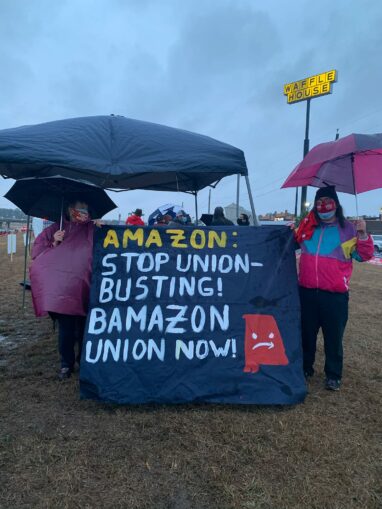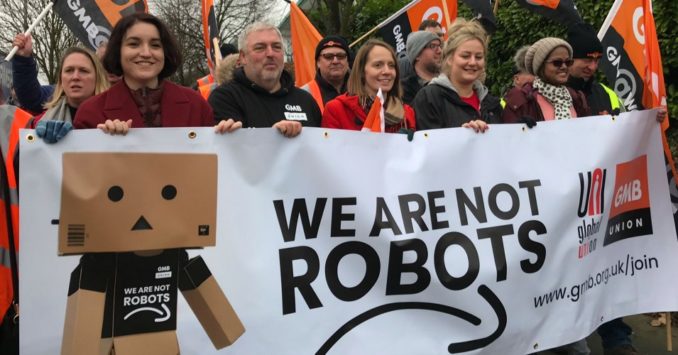The Bessemer front in the international class struggle
Bessemer, Ala., is now the site of a historic labor struggle between the majority-Black Amazon warehouse workers there and the $1.7 trillion international capitalist monopoly corporation. About 80% of the warehouse workers are African American, and almost half are women.

Rally for Amazon workers, Bessemer, Ala., Feb. 6.
In March 2020, Amazon opened up the BHM1 fulfillment center in this predominantly Black working-class city that sits on the west edge of Birmingham, Ala. Within two months, the workers began to push for union representation by the Retail, Wholesale, and Department Store Union (RWDSU). The workers dubbed themselves “BAmazon Union.”
If successful, the Alabama workers will have established the first union in the U.S. within behemoth Amazon.
The workers were spurred by brutally harsh working conditions, the threat of demotion or termination for not meeting ever-increasing quotas and management’s refusal to take measures to adequately protect workers from COVID-19.
According to Michael “Big Mike” Foster, a key union organizer and poultry plant worker, “We didn’t just show up at Amazon. The workers from Amazon called us. Because they have been crying out with their voices, and Amazon has ignored them the whole time. So we got together with the group, and we put a plan together to come out here and help these people.” (facebook.com/SupportAmazonWorkers)
Union drive accelerates
By last November, over 2,000 workers had signed cards and a petition to call for union recognition. Then RWDSU successfully petitioned the National Labor Relations Board to schedule a vote. For an NLRB election to be set, at least 30% of workers at a location have to sign a nonbinding union card — a goal which was well surpassed.
The NLRB agreed to a mail-in vote in accordance with social distancing safety. Amazon then appealed that decision and pressed for an in-person vote — a ploy to suppress voter turn-out. The NLRB denied Amazon’s appeal. The workers began voting on Feb. 8 and have until March 29 to return their ballots. Vote counting is scheduled to start the following day.
The possibility of a Bessemer union victory is heightened by Amazon’s vulnerability to organized labor action during the COVID pandemic. Unlike manufacturing, which can be moved out of Alabama or even overseas, Amazon needs its merchandise warehoused near customers for “last mile delivery.” Amazon can’t stockpile packages and wait out a strike or protest — that would upend its “instant shipping” promise. Increased pandemic online shopping makes warehouse workers more essential than ever — and gives these workers more weight and incentive to organize.
Fierce freedom organizing in Alabama
Alabama — particularly the Birmingham-Bessemer area — has a centuries-old tradition of Black-led organizing against enslavement, racist land seizures, Jim Crow racism, prison-convict labor, segregation laws and Ku Klux Klan violence. Within living memory of the Amazon workers and their families is their starkly dedicated struggle against white-supremacist assassinations and bombings of Black churches and homes during the Civil Rights Movement of the 1960s.
And despite the reactionary Jim Crow Taft-Hartley Act “right-to-work” law in Alabama, the state has a militant tradition of worker organizing, especially Black workers. From 1928 to 1951, the Communist Party successfully organized throughout Alabama from the Sharecroppers Union to the Mine, Mill and Smelter Workers union, which is majority Black. (Workers World, “Lessons of ‘The Hammer and the Hoe,’” Dec. 21, 2017)
There are parallels between the Bessemer struggle and the fierce class battle of the 1930s against the world’s then-largest corporation: General Motors. GM’s assembly lines were not that different from Amazon’s; GM’s notorious speedup — when management ran auto assembly lines faster to increase production — became a standard corporate management tactic to more heavily exploit workers.
The victory at GM inspired more union struggles and victories in a range of industries. The historic Flint Sit-Down Strike by workers — a 44-day occupation of Michigan plants — won the first union contract from GM in 1937. (Workers World, “GM 1937, Amazon 2021: Which side are you on?” Feb. 2)
Amazon attacks worker organizing
Today the BAmazon workers in Bessemer are going up against the second-largest company in the U.S. and the ninth-largest in the world. Including Amazon-owned Whole Foods, the company currently employs 1.37 million workers in the U.S., not counting delivery drivers.
Amazon has the highest market capitalization — based on stock value and number of outstanding shares — of any corporation anywhere. To keep its stock prices and profits astronomical, Amazon must keep its workers from unionizing, wherever and however it can.
In Bessemer, Amazon is running an aggressive campaign of lies and intimidation. Management posts anti-union material throughout the warehouse and sends texts threatening to close if unionized.
A company website is rife with misinformation, stating: “An authorization card or online form is LEGALLY BINDING and may obligate you to PAY monthly dues immediately from YOUR PAYCHECK. There are no free trials.”
That statement is a lie. Neither the cards nor the online forms are legally binding. The Taft-Hartley Act was originally passed to break up union organizing in the South, and workers in “right-to-work” states like Alabama are therefore neither obligated to join a union nor pay dues if they work in a unionized shop.
The company has sent emails to BAmazon workers offering to pay $2,000 or more if they will resign their jobs — a tactic that may be an illegal bribe under federal law. (paydayreport.com, Feb. 21) And there have even been reports that Amazon had traffic lights “mistimed” to keep organizers from talking to workers driving in and out during shift changes. (tinyurl.com/y9zogdem)
Amazon has relied on the notoriously anti-union law firm Morgan Lewis to attack worker organizing. Morgan Lewis has fought other Amazon unionization attempts and defended the company against worker lawsuits over inadequate pandemic precautions and racist discrimination. The law firm writes that it aims to “identify risks and develop strategies and solutions to help employers avoid litigation and other employee disputes, including those that involve unions or organizing campaigns.” (tinyurl.com/j24bz85b)
Solidarity campaign
Amazon has spared no expense in fighting unionization at one warehouse. That reflects the capitalist need to hold absolute power to exploit workers. Amazon’s union-busting campaign shows the company knows the potential impact beyond Bessemer.

Amazon workers walk out in Britain, 2018.
Workers in European countries have been organizing — and striking — at Amazon units for several years. In 2018, workers — represented in Germany by the Ver.di service workers’ union, in Spain by UNI Global Union and in Britain by GMB — walked out or struck on Amazon Prime Days in July 16-17, 2020, and “Black Friday” in November.
What happens at Bessemer has global implications. The stakes in the current battle could not be higher — for Amazon workers everywhere and ultimately for the worldwide working class. This fight is a fight of the international proletariat.
What is most needed now is mass global solidarity with the Bessemer workers of Amazon BHM1. On Feb. 20, a U.S. campaign generated over 50 simultaneous solidarity actions. More actions are underway throughout March.
For solidarity actions, see supportamazonworkers.org.
Other contributors to this article were John Catalinotto, Martha Grevatt and Minnie Bruce Pratt.

